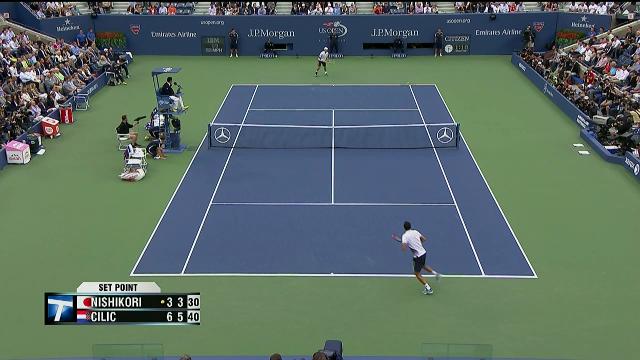Marin Cilic's breakthrough Open win gives others hope

NEW YORK -- For the first time in more than a decade men's tennis crowned two new Grand Slam champions in 2014: Stan Wawrinka in Australia and Marin Cilic on Monday at the U.S. Open.
Cilic, a 25-year-old Croat seeded 14th, dominated 10th-seeded Kei Nishikori of Japan 6-3, 6-3, 6-3 in one hour and 54 minutes.
In 2003, three blooming talents broke through to win their maiden Grand Slam titles: Juan Carlos Ferrero at Roland Garros, Roger Federer at Wimbledon and Andy Roddick at the U.S. Open.
Federer, the record holder with 17 Grand Slam crowns, was just getting started. Ferrero and Roddick would not win another. But all three eventually held the No. 1 ranking.
Whether such lofty standards await Grand Slam final debutants Nishikori, 24, and Cilic, remain to be seen.
But they have provided another jolt of belief to a tour long dominated by four men.
"For all the other players working hard, I think this is a big sign and a big hope that all the work is paying off," said Cilic during Monday's on-court trophy ceremony.
Discounting the Big Four, of course, has often been a losing proposition. Novak Djokovic, Rafael Nadal, Federer and Andy Murray have captured 36 of the past 39 majors. They also contested finals at the French Open (Nadal over Djokovic) and Wimbledon (Djokovic over Federer).
But age — none is younger than 27 and Federer is 33 — and recent results point to a tilt that has been coming for some time.
"You have the emerging stars and the established stars converging," said ATP board member and television commentator Justin Gimelstob. "It's a hybrid. And it's an exciting time in the sport."
In the cycle-of-life that is tennis, some transitions are more jarring than others.
Mats Wilander, the 1988 U.S. Open winner, recalled that when his Swedish compatriot Bjorn Borg left tennis in 1981 at age 26 it created a considerable vacuum, even though John McEnroe was asserting his control over the sport.
It opened the door for then-17-year-old Wilander to win his first major at the 1982 French Open. Borg had won the last four titles in Paris and six of the previous eight.
Different players won five of the next 10 majors.
"It's inevitable," said Wilander of the generational shift. "But I think it matters how it happens."
Wilander was referring to the way Nishikori and Cilic reached the New York final — with decisive victories against Djokovic and Federer, who own a combined 24 Grand Slam titles.
"They kicked their butts," he said.
The showing by Cilic and Nishikori should embolden players such as Milos Raonic of Canada, Grigor Dimitrov of Bulgaria and Ernests Gulbis of Latvia. All three 26-and-unders reached Grand Slam semifinals in 2014.
Goran Ivanisevic, the 2001 Wimbledon winner and guiding force behind Cilic's victory, predicted that Nishikori, Raonic and Dimitrov would all win majors, just as he predicted they and Cilic would be top-10 players this season.
"Looks like I know something about tennis," the big-serving Croat told to a group of reporters on Monday. "For sure (there are) three more potential winners of the Grand Slams, which is another great story for tennis," he added."
Can the old guard hang on?
Djokovic is still No. 1, Nadal didn't even defend his title in New York and Murray showed signs of returning to his major-winning form.
Federer looks most vulnerable, despite his strong showing after a subpar 2013.
With favorable draws and his back no longer a problem, the third-ranked Swiss had two of his best chances to add to his haul of majors in London and New York. Both times, he got outplayed and fell short.
How much longer he can stay relevant will only become a bigger question. But the sport's Iron Man — Federer has competed in a record 60 consecutive majors — appears motivated and capable of taking down most foes despite his role as husband and father to two sets of twins.
"I always believe they'll be in the mix as long as they're healthy," Gimelstob said of the Big Four. "I just believe they'll be less dominant and more guys will emerge."